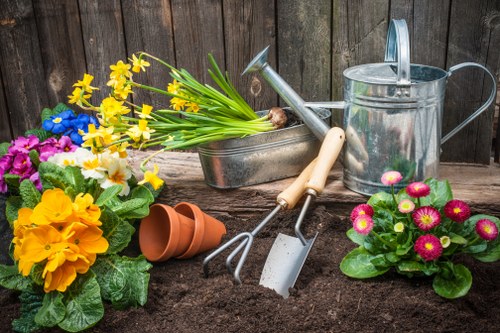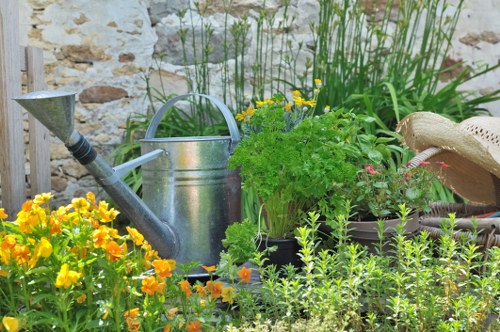Garden Maintenance in New Cross: Your Complete Guide to a Beautiful Garden

Introduction to Garden Maintenance
Maintaining a garden in New Cross requires a blend of **passion**, **knowledge**, and regular upkeep. Whether you're a seasoned gardener or just starting, understanding the unique aspects of garden care in this vibrant London area is essential for a thriving outdoor space.
New Cross offers a diverse climate and soil conditions, making it crucial to tailor your garden maintenance practices accordingly. From selecting the right plants to seasonal care, this guide covers everything you need to keep your garden in top shape.
Regular maintenance not only enhances the aesthetic appeal of your garden but also ensures the health and longevity of your plants. By following the best practices outlined below, you can create a lush, sustainable garden that serves as a peaceful retreat in the heart of New Cross.

Essential Garden Maintenance Tasks
1. Pruning and Trimming
Pruning is a fundamental aspect of garden maintenance. It involves removing dead or overgrown branches to promote healthy growth and improve plant shape.
**Regular pruning** helps prevent diseases and allows more sunlight to reach the inner parts of the plant, fostering better air circulation. Tools like sharp pruners and loppers are essential for effective trimming.
For best results, prune during the dormant season to minimize stress on the plants. However, deadheading flowering plants throughout the growing season encourages continuous blooms.

2. Weeding
Weeds compete with your garden plants for nutrients, water, and light. Regular weeding is necessary to maintain a healthy garden ecosystem.
Using mulch can significantly reduce weed growth by blocking sunlight and preventing weed seeds from germinating. Additionally, hand-pulling weeds or using a hoe early in the morning when the soil is moist makes the task easier and more effective.
Consider implementing a weed barrier fabric in garden beds to further minimize weed problems. Consistent weeding not only enhances the garden's appearance but also reduces the spread of pests and diseases.

3. Watering and Irrigation
Proper watering is critical for plant health. Overwatering can lead to root rot, while underwatering stresses plants and inhibits growth.
**Efficient irrigation systems**, such as drip irrigation or soaker hoses, deliver water directly to the plant roots, minimizing evaporation and waste. Installing a timer can ensure consistent watering schedules, especially during dry periods.
It's important to water early in the morning or late in the evening to reduce water loss and prevent fungal diseases. Additionally, incorporating rainwater harvesting systems can make your garden more sustainable and eco-friendly.

Seasonal Garden Maintenance Tips
Spring
Spring is a time of renewal and growth. Start by clearing out any debris from the winter months and preparing your garden beds for planting.
**Fertilizing** your soil in spring provides essential nutrients for new growth. Choose a balanced fertilizer that suits the specific needs of your plants.
Planting early bloomers and perennials in spring ensures they have enough time to establish before the heat of summer.
Summer
Summer maintenance focuses on managing heat stress and ensuring adequate water supply. Mulching helps retain soil moisture and keeps roots cool.
Regularly monitor your garden for signs of pests and diseases, addressing issues promptly to prevent widespread damage.
Pruning can also be done in summer to shape plants and remove any damaged parts.

Autumn
Autumn is the perfect time for cleanup and preparation for the dormant season. Remove spent plants and add organic matter to enrich the soil.
**Planting bulbs** in autumn ensures beautiful spring blooms. Choose varieties suitable for New Cross climate conditions.
Protect sensitive plants from frost by using covers or relocating potted plants indoors.
Winter
Winter garden maintenance involves safeguarding your plants against cold weather. Mulching thickly around the base of plants provides insulation.
Pruning can be limited to removing any dead or diseased wood, avoiding heavy pruning that might expose plants to more stress.
Plan and design your garden layout for the coming year, taking into account the performance of previous seasons.

Choosing the Right Plants for New Cross
Selecting plants that thrive in the local climate and soil conditions of New Cross is essential for easy maintenance and a vibrant garden.
**Perennials**, annuals, and shrubs each offer unique benefits. Perennials return year after year, providing long-term structure, while annuals offer seasonal color.
Consider native plants that are well-adapted to the environment, reducing the need for excessive water and fertilizers.
Low-Maintenance Plants
If you prefer a garden that requires minimal upkeep, choose plants that are hardy and resilient. Examples include lavender, hostas, and ornamental grasses.
These plants often have drought-resistant properties and can withstand the typical weather variations in New Cross.
Incorporating a variety of textures and colors can create an attractive garden without extensive maintenance efforts.
Flowering Plants
Flowering plants add beauty and fragrance to your garden. Roses, tulips, and daffodils are popular choices that can thrive with proper care.
Ensure that flowering plants receive adequate sunlight and are planted in well-drained soil to promote healthy blooms.
Deadheading spent flowers encourages new growth and extends the blooming period.

Soil Management and Fertilization
Healthy soil is the foundation of a thriving garden. Regularly testing your soil can help determine its pH and nutrient levels.
**Amending the soil** with compost or organic matter improves its structure, fertility, and water-holding capacity.
Different plants have varying soil requirements, so tailor your soil management practices to meet the specific needs of your garden.
Fertilization Tips
Fertilizing provides essential nutrients that fuel plant growth. Choose a fertilizer based on the specific requirements of your plants.
A balanced fertilizer with equal parts nitrogen, phosphorus, and potassium is suitable for most gardens.
Avoid over-fertilizing, as it can lead to nutrient runoff and environmental issues. Follow recommended application rates for optimal results.
Organic vs. Synthetic Fertilizers
Organic fertilizers, such as compost and manure, improve soil health by adding organic matter and beneficial microorganisms.
Synthetic fertilizers provide immediate nutrients but do not enhance soil structure. A combination of both can offer balanced benefits.
Consider the environmental impact of your fertilizer choices and opt for eco-friendly options whenever possible.

Pest and Disease Management
Managing pests and diseases is crucial to maintaining a healthy garden. Early detection and intervention can prevent minor issues from becoming major problems.
**Integrated Pest Management (IPM)** is an effective strategy that combines biological, cultural, and chemical controls to manage pests sustainably.
Encourage beneficial insects, such as ladybugs and bees, which help control pest populations naturally.
Common Garden Pests in New Cross
- Aphids: Small insects that suck sap from plants, causing stunted growth.
- Slugs and Snails: Mollusks that feed on a variety of plants, leaving unsightly holes.
- Whiteflies: Tiny, white insects that infest the undersides of leaves, leading to yellowing and wilting.
Regularly inspect your plants for signs of pest activity and take appropriate measures to control infestations.
Disease Prevention
Diseases like powdery mildew, clubroot, and blight can severely impact your garden's health. Preventative measures include proper spacing of plants, adequate watering practices, and selecting disease-resistant varieties.
Remove and dispose of any infected plant material to prevent the spread of diseases. Implementing crop rotation in vegetable gardens can also reduce disease prevalence.
Maintain good garden hygiene by keeping tools clean and sterilized to avoid transferring pathogens between plants.

Tools and Equipment for Garden Maintenance
Having the right tools is essential for efficient garden maintenance. Investing in quality equipment can make tasks easier and more enjoyable.
- Pruners and Shears: For precise trimming and shaping of plants.
- Garden Hose and Irrigation Systems: Ensure adequate watering of your garden.
- Weeding Tools: Essential for removing unwanted plants without damaging the soil.
- Soil Test Kits: Help monitor soil health and nutrient levels.
- Compost Bins: Facilitate the recycling of garden and kitchen waste into valuable compost.
Regular maintenance of your tools, such as cleaning and sharpening, extends their lifespan and ensures optimal performance.
Consider ergonomically designed tools to reduce strain and increase comfort during extended gardening sessions.
Safety gear, including gloves and protective eyewear, should be worn to prevent injuries while performing garden tasks.

Landscaping and Garden Design
Thoughtful landscaping enhances the beauty and functionality of your garden. A well-designed garden reflects your personal style while maximizing the use of available space.
**Creating focal points**, such as water features or ornamental structures, adds interest and guides the eye through the garden.
Incorporate pathways and seating areas to make your garden more accessible and inviting for relaxation and social gatherings.
Choosing the Right Layout
Select a layout that complements your garden's size and shape. Symmetrical designs offer a formal look, while asymmetrical arrangements create a more natural and relaxed atmosphere.
Consider the placement of plants based on their light and space requirements to ensure optimal growth and aesthetics.
Utilize vertical space with trellises or hanging plants to add depth and dimension to your garden.
Adding Hardscapes
Hardscapes, such as patios, decks, and garden walls, provide structure and functionality. They offer areas for outdoor dining, lounging, and entertainment.
Choose materials that complement your garden's overall design and are durable enough to withstand the local climate.
Incorporating lighting into hardscapes enhances the garden's ambiance and extends its usability into the evening hours.

Sustainable Garden Practices
Adopting sustainable practices in your garden helps protect the environment and promotes long-term garden health.
**Composting** kitchen and garden waste reduces landfill contributions and provides rich fertilizer for your plants.
Implementing rainwater harvesting systems minimizes water usage and ensures a consistent water supply during dry periods.
Reducing Chemical Use
Avoiding synthetic fertilizers and pesticides protects beneficial insects and maintains soil health. Opt for organic alternatives, such as neem oil or compost tea, to manage pests and enhance plant growth.
Using mulch and ground covers naturally suppresses weeds and retains soil moisture, reducing the need for chemical interventions.
Encourage biodiversity by planting a variety of species, which supports a balanced ecosystem and naturally deters pests.
Energy-Efficient Gardening
Energy-efficient gardening practices include using solar-powered lighting and water features, as well as choosing plants that require less maintenance and resources.
Implementing permaculture principles can create a self-sustaining garden that works with nature rather than against it.
By prioritizing sustainability, you contribute to environmental conservation and create a resilient garden that thrives year after year.

Hiring Professional Garden Maintenance Services
While DIY garden maintenance is rewarding, sometimes hiring professionals can save time and ensure expert care.
**Professional gardeners** bring specialized knowledge and experience, especially for complex tasks like soil management, pest control, and landscape design.
When selecting a garden maintenance service in New Cross, consider factors such as reputation, range of services offered, and pricing.
Benefits of Professional Services
- Expertise: Professionals have the skills to diagnose and treat plant issues effectively.
- Time-Saving: Outsourcing maintenance frees up your time for other activities.
- Customized Care: Tailored maintenance plans ensure your garden receives the attention it needs.
Investing in professional garden maintenance can lead to a more vibrant and healthy garden with minimal effort on your part.
Choosing the Right Service Provider
Research potential service providers by reading reviews and asking for referrals. Ensure they understand the specific requirements of gardens in New Cross.
Request quotes and compare services to find the best fit for your budget and gardening needs.
Clear communication about your expectations and preferences is essential for a successful partnership with your chosen garden maintenance service.

Conclusion
Effective garden maintenance in New Cross blends regular care with strategic planning. By understanding the local climate, selecting suitable plants, and implementing sustainable practices, you can cultivate a beautiful and thriving garden.
Whether you choose to maintain the garden yourself or enlist professional services, the key is consistency and attention to detail. A well-maintained garden not only enhances your property's curb appeal but also provides a serene environment to enjoy nature's beauty.
Start your garden maintenance journey today and transform your outdoor space into a lush, inviting sanctuary.

Get Started with Your Garden Maintenance Today!
Ready to transform your garden into a stunning oasis? **Contact us today** to learn more about our comprehensive garden maintenance services in New Cross. Our team of experts is here to help you achieve the garden of your dreams.
Don't wait—**book your service now** and take the first step towards a beautiful, well-maintained garden.